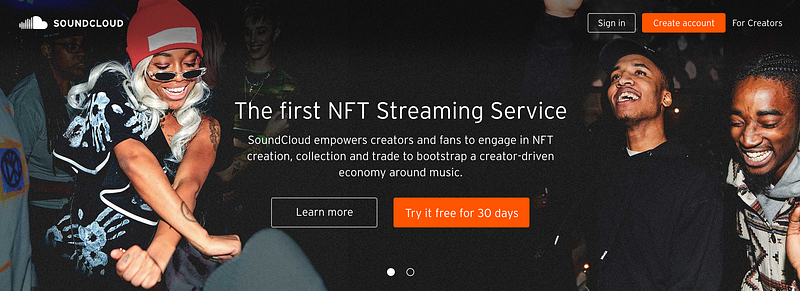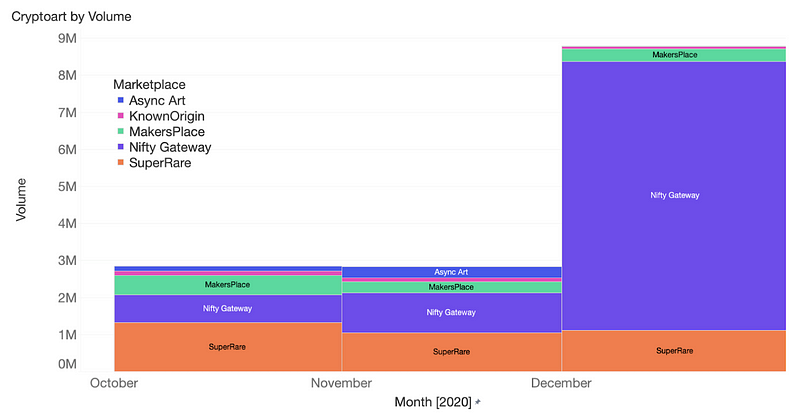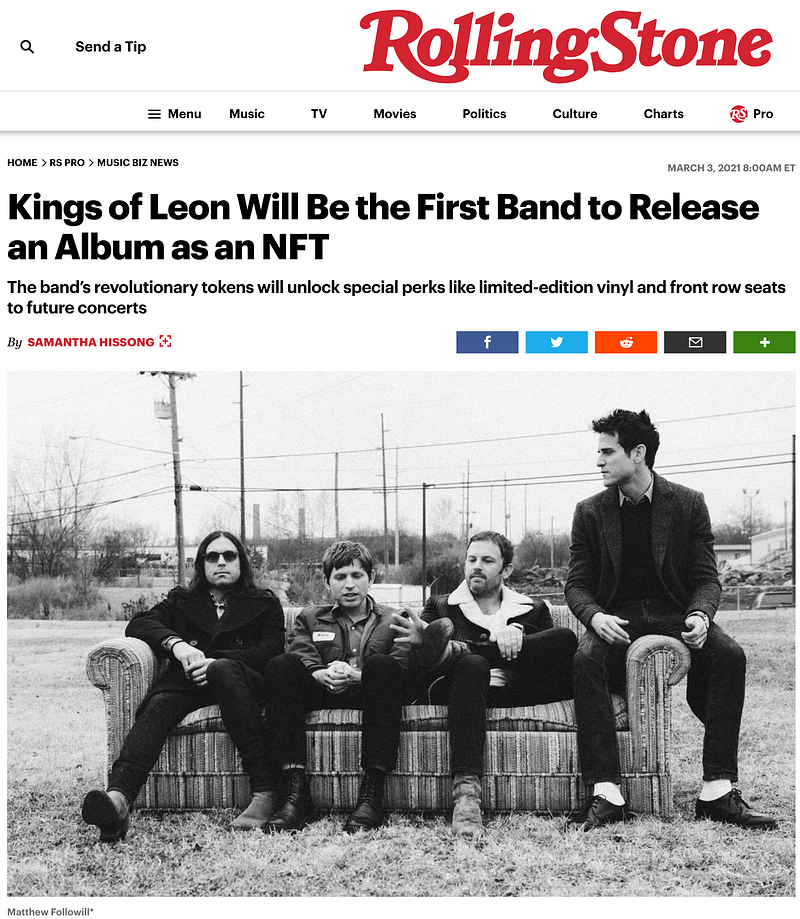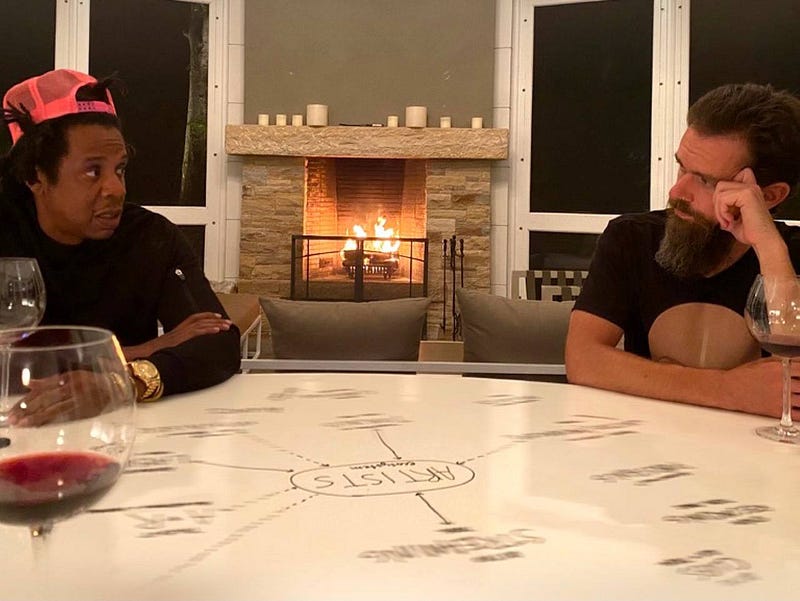How SoundCloud could do NFTs
This blog post describes a hypothetical scenario where SoundCloud the music streaming company would start empowering creators and fans to…
How SoundCloud could do NFTs

This blog post describes a hypothetical scenario where SoundCloud the music streaming company would start empowering creators and fans to engage in NFT creation, collection and trade to bootstrap a creator-driven economy around music.
In my 2016 post on “A Blockchain Token Taxonomy” I have described the fundamental distinction between fungible and non-fungible tokens. The latter, NFT for short, are currently receiving massive adoption and media attention. Three years after CryptoKitties have famously proven the viability of the concept, creators of digital art have recently started to create and successfully sell NFT-based collectibles associated with digital art pieces. Platforms such as Rarible and OpenSea facilitate the issuance and trading of these digital collectibles.

Source: https://consensys.net/blog/codefi/how-nft-art-marketplaces-are-merging-with-defi/
In March 2021, the first NFT for a digital art piece was auctioned by Christies, achieving a final prize of USD 69 Mio for the token.
Blockchain-wise, the Ethereum blockchain is the main infrastructure used, employing the ERC721 token standard. Due to transaction cost and concerns with the underlying PoW consensus of Ethereum, second layer solutions and alternative PoS blockchains are being explored as well.
What about music?
Recently, the famous rock band Kings of Leon has announced its plans to sell their new album with the help of NFTs.

Problems in the music industry today
The way digital music is distributed today prevents creators from directly monetizing with their listeners and fans. Flat-rate models of platforms intermediate these interactions heavily and have ultimately led to a divide between fans and creators. Only few creators can actually live from the royalties they earn in the platform economy. On top, a persistent oligopoly of major labels continues to control a majority of the global market, skewing it in its favor.
Potential of NFTs for creators of digital music
So, how can NFTs change all of that? In the context of music and generally exploitation of IP, blockchain can play a foundational role in changing the way creators and listeners connect and exchange value. It goes way beyond the modest attempts we’ve seen by artists such as Kings of Leon so far. But to unlock this universe of possibilities, it needs more than a single artist. It needs a major music streaming platform with hundreds of millions of users.
Digital Scarcity for Music
It all starts with introducing digital scarcity to music.
How can the concept of digital scarcity be applied to music?
There are fundamentally two ways in which digital scarcity can be applied to music. The first one is digital collectibles, and it’s what we’ve seen done by artists like Kings of Leon. In detail:
Kings of Leon’s album will be released everywhere albums are released — Spotify, iTunes, Apple Music, Amazon — but the NFT version available on YellowHeart will be the only product with special perks. The token, priced at $50, includes enhanced media — kind of like an alternate, moving album cover — as well as a digital download of the music, and limited-edition vinyl. The sale of the album NFTs opens on Friday at 12 p.m. E.T. and continues for two weeks. After that time, no more will be made, and the NFT becomes a tradable collectible.
[…]
YellowHeart is minting 18 unique-looking “golden tickets” as part of the Kings of Leon NFT release. Out of the 18, the band will auction six and vault the other 12 like a painter would do with a rare piece from a series of art. “Each one of those is a unique NFT with the most incredible Kings of Leon art you’ve ever seen,” explains Katz.
Each “golden ticket” also unlocks an actual concert ticket — marking the first time a music ticket has been officially sold as an NFT. Whoever owns the token is guaranteed four front-row seats to any Kings of Leon concert during each tour for life. The token owner also gets a VIP experience that includes a personal driver, a concierge at the show to take care of their needs, a hangout with the band before the show, and exclusive lounge access. Upon leaving the show, the fan’s car will have four bags filled with every item from the merch booth.
Although the distribution model for their music is not at all changed, Kings of Leon leverages NFTs to directly connect with their fans so as to empower them to express the true value the band and its music has in their lives. The blockchain is a convenient infrastructure to use for the band, since the ecosystem surrounding it takes over all of the tech, legal and distribution bottlenecks they would face if they did it all from scratch. In particular, the ability for those tokens to be traded by collectors and fans in perpetuity, while the artists could get a percentage of each of those transactions, already creates a circular economy for the benefit of creators.
What is needed for the large scale success of this new model for artists to connect with fans is a dedicated platform that combines the music, the associated collectibles and the market infrastructure for users to buy, sell and invest in these digital assets.
Scarcity all the way
In the model I just described, the music itself would still be distributed traditionally, making the music itself not scarce. The next step would be for artists to distribute music in such a way, where only the owner of an NFT can stream an associated piece of music. I.e. limited edition releases of digital music. For this to work, a major music streaming platform would have to introduce an end-to-end system, where only users who own a certain token in their wallet are allowed to playback a certain track, combined with a trading platform where users can acquire such tokens from the artist or from other users.
What does SoundCloud have to do with this?
It all has to do with strategy credit. Unlike other music streaming services in the space, SoundCloud is a truly free player in a very unfree market centered around IP owned by a media oligopoly. The reason SoundCloud assumes this unicorn status in the industry, is because it is built on a unique collection of original IP owned by millions of creators. Music, that is untouched by labels or other IP contracts.
While in the past the company has struggled to find a sustainable business model just based on this original IP alone, it misguidedly stepped into the bondage of said media oligopoly, by licensing essentially the same music catalogue as Spotify does, fighting for users on a commodified streaming market.
A much better strategy for SoundCloud would be to capitalize on its unique assets — its strategy credit: the original content, its creators and their fans. By bringing them together in a circular economy around scarce digital goods, SoundCloud could create a social redistribution engine for creators and consumers (B2C2C2B) that is much better suited at finding the true value that creators and their art have in the lives of people and communities.
What should SoundCloud do?
It’s pretty straight-forward. SoundCloud should bootstrap a DeFi economy around scarce digital goods, including the music itself.
For creators:
- Allow creators to mint NFTs that can represent a number of things — be it a voucher for a concert, a token that represents “nothing” in a factual or legal sense, or a token that mediates factual access to a consumable media file, e.g. a streamable mp3. Give artists the option to configure the smart contract such that they earn on each resale of these NFTs in perpetuity.
- Give artists a simple way to sell these NFTs to users, e.g. through auctions. This could happen on artists’ profile pages but also on a dedicated market interface.
For users:
- Give every user on SoundCloud a self-custodial wallet. In particular SoundClouds mobile app is perfectly suited for that.
- Seamlessly integrate peer-to-peer crypto-payments for NFTs by allowing users to top-up their wallets with their credit cards. Basically integrate MoonPay. As currency for payment use either a stablecoin or a dedicated SoundCloud Payment Token.
- Build an NFT-based authentication system where SoundCloud only streams a media file to a user if they own the corresponding NFT.
- Provide a set of standard legal terms for creators to use to ensure that vouchers, access to IP and other goods are properly defined and transacted in the market place.
What would SoundClouds business model be?
While continuing to release music for free on SoundCloud, artists would more and more often choose to sell some of their their music also as limited editions on the NFT streaming market, as well as surrounding digital merchandise, e.g. different album art. Users would pay for acquiring NFT-based songs, collect them and at times resell them on secondary markets, creating a circular economy around scarce digital goods. Since all transactions are peer-to-peer between artist and fan, DeFi protocols would soon step in and create proper markets around speculation on the future value of these assets as well as yield farming revenues.
Once an NFT-streaming market is established, artists would start to auction limited edition access to future works, thereby pre-financing albums by the crowd.
SoundCloud as a marketplace and infrastructure provider, could benefit from this decentralized economy around original music IP in a multitude of ways. In essence, SoundCloud could capture the value at the protocol level as well as on the application level.
Who’s competing with SoundCloud?
Looking at the competitive landscape in digital music distribution, the real magnitude of SoundClouds strategy credit becomes apparent.
**Spotify
**Spotify is the antithesis of SoundCloud. Spotify didn’t start with original IP of creators but instead licensed catalogues of rights from major labels. As much as it propelled Spotify to its prominent position today, it comes with a massive strategy tax. Spotify has no ability to truly innovate in how else to capture the value of the IP associated with artists and their brand. This is the sole purview of the labels owning that IP. Only now, with podcasts, is Spotify moving into the original IP territory, by unlocking a new user base, unhinged by labels and IP buyouts. And it’s far from clear whether Spotify will be able to monetize on Podcasts as much as they seem to be expecting to.
So, when looking at Spotify in particular, SoundCloud has finally come to the point in its 14 year evolution, where it can truly harvest the fruits of its early strategic insight, that aggregating original IP unhinged by major labels is fundamentally valuable.
**Jack Dorsey
**The only true competitor SoundCloud may face, is Jack Dorsey. The Twitter founder who is auctioning his first tweet as an NFT with the highest bid currently at USD 2.5 million, just recently bought the music streaming service Tidal with this financial services company Square for USD 300 million from Jay-Z.

Jack gets it. And he wants to own a piece of the burgeoning creator economy. Combining end-to-end music streaming with NFTs, market infrastructure and payment gateways, opens huge opportunities.
The future of sound on the cloud
SoundCloud is at a crossroads, having to decide whether it wants to be again at the forefront of digital transformation in the music industry just as it was when the company started out in 2007. While the first decade of the 21st century was about moving music to the cloud, the new decade is about building an economy on top of this infrastructure, that works for both creators and consumers. SoundCloud is again in a unique position to lead the way for the whole industry. However, this time, SoundCloud may own a large piece of the infrastructure on top of which future use cases will be built.
By Florian Glatz on March 12, 2021.
Exported from Medium on January 3, 2025.